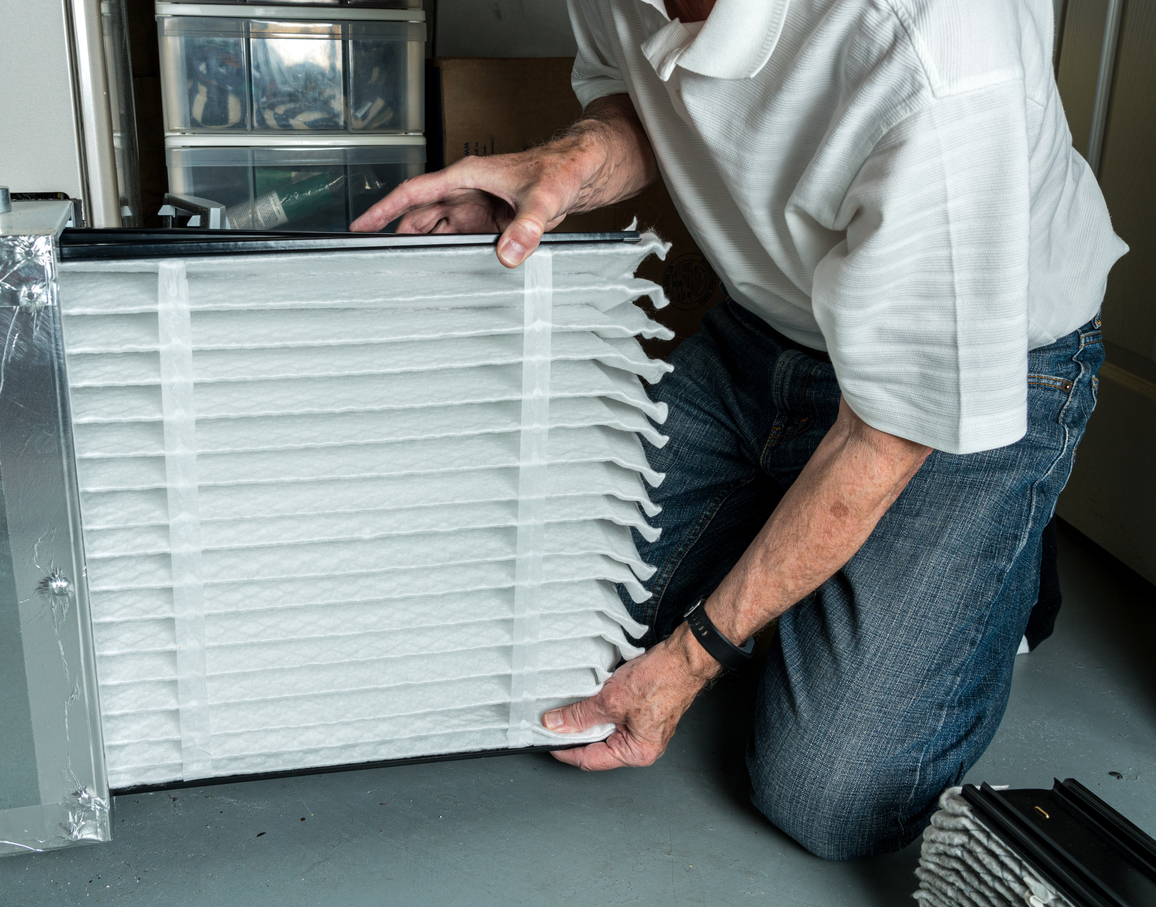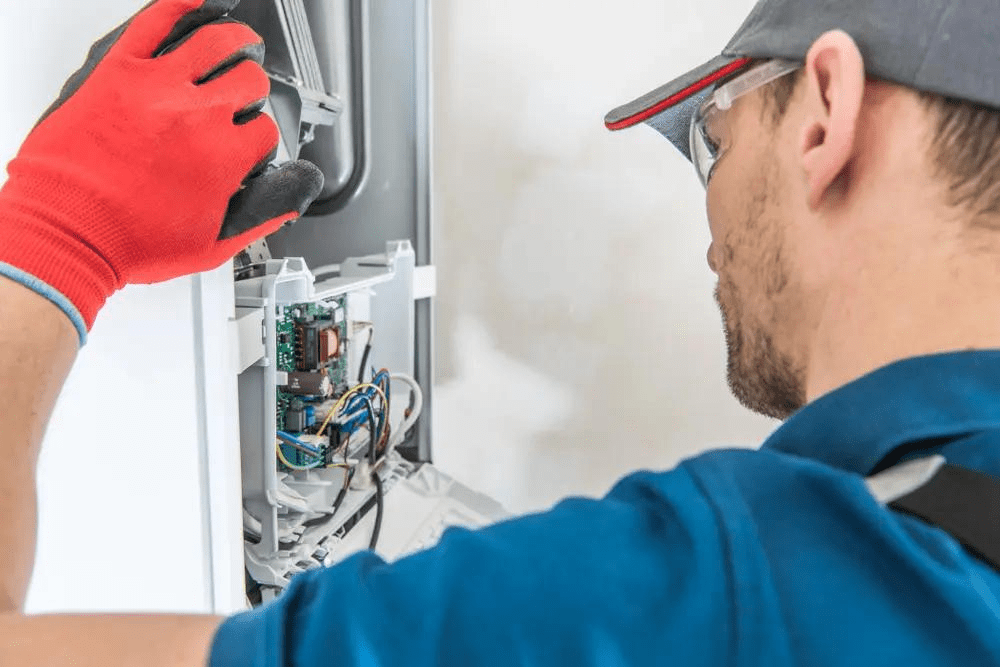We may earn revenue from the products available on this page and participate in affiliate programs. Learn More ›
Q: My furnace is making loud rumbling noises, and I don’t know what to do. Why is my furnace so loud all of a sudden? Is this something I can fix myself, or do I need to hire someone?
A: When trying to determine “Why is my furnace so loud when running?” many homeowners may find it’s as simple as replacing a clogged air filter. But the fix isn’t always so simple. A loud furnace could be due to something more serious, such as a failing motor. Homeowners can evaluate some of these causes and correct them on their own, but calling in a professional HVAC technician can ensure that the issue is properly diagnosed and handled in a timely manner.
A furnace making a loud banging noise can indicate a dirty burner.
A furnace uses a burner that combines air and fuel to produce a flame that heats the air. This flame requires an igniter to turn that air/fuel mix into a flame. The igniter could be a pilot light or an electric igniter that creates a spark to burn the mixture.
When the burner becomes dirty, it may take longer for the igniter to burn the air/fuel mix. If that happens, the air/fuel mix can build up so that when it does ignite, it makes a loud banging noise. Unless a homeowner has experience dealing with gas burners, cleaning a burner should be left to the professionals. Otherwise, it’s possible the home could be left with a gas leak that could be quite serious.
A loud boom from a gas furnace means that the air-to-fuel ratio could be unbalanced.
To function properly, the furnace must have the correct air-to-fuel ratio so the burners ignite without delay and heat the air as prescribed. When the air-to-fuel ratio is not balanced, it can lead to delayed ignition that results in a loud boom when the fuel builds up. Adjusting the air-to-fuel ratio is not something a homeowner should try without training and experience. It could lead to excess gas in the home, which could result in more problems. It’s important to call a licensed HVAC technician to evaluate and adjust the air-to-fuel ratio so the furnace functions correctly without any loud booms.
A dirty pilot light can lead to a furnace making loud noises.
Just as with a dirty burner, a dirty pilot light can interfere with igniting the burner. If the ignition is delayed, fuel can build up; when it finally does ignite, it can lead to a loud noise. When dirt builds up in the pilot light, the light can struggle to stay lit or could be too weak to ignite the fuel. Cleaning a dirty pilot light can be as simple as blowing air through the pilot light using a can of compressed air. However, if that doesn’t work, it will be necessary to turn the task over to a technician who can take the pilot light assembly apart to clean it.
Clogged air filters can cause whistling sounds.
Air filters on furnaces clean the air that is taken in by the furnace, heated, and pumped into the house. When those filters become clogged, the furnace becomes inefficient, leading to reduced airflow. This could lead to a furnace making a loud humming noise or whistling noise. Homeowners will want to replace their furnace’s air filter regularly (every 1 to 3 months for 1- to 2-inch filters or every 6 to 9 months for 3- to 4-inch filters) to ensure the system works at maximum efficiency. If changing the filter does not stop the furnace from making a loud buzzing noise, it is advised to have the furnace examined by a licensed HVAC professional.

Holes or joints in the ductwork can create unexpected noises.
The metal ductwork installed to transport air from the furnace and air conditioner to the air vents is designed to expand and contract—cold air will make the material contract, and warm air will make it expand. As such, when the furnace first turns on after a time off, homeowners may hear some unexpected noises as the hot air moves through the ductwork. However, if these noises happen frequently or become louder, it may indicate that a piece of ductwork needs to be replaced. It’s also possible the joints or screws in the ductwork may be loose, which would result in unexpected noises as the air moves through.
A failing motor could be the cause of a too-loud furnace.
Every furnace contains a blower motor that forces the warm air from the furnace into the ducts and throughout the home via the air vents. If the belt on the blower motor starts to weaken, homeowners could hear a furnace blower that’s too loud making a squeak or squeal. Replacing the belt could resolve the problem, but this is not a task that homeowners will want to take on themselves. Likewise, if the noise sounds like metal scraping on metal, that could indicate a more serious problem with the motor, such as a loose or broken blower wheel. If homeowners hear this noise, they’ll want to immediately shut off the furnace and call a professional technician to inspect the furnace.
The problem might be as simple as a loose vent cover.
Vent covers may be on the floors, in the walls, or in the ceilings. If the vent cover is loose, it could rattle when the air blows through it. It may also sound like the furnace makes a loud noise when turning off—when the air stops flowing through the loose vent cover, the cover could settle back into place and make noise.
Using a screwdriver, homeowners can tighten the screws holding the air vent cover in place. It’s important to tighten them enough to stop the air vent cover from rattling but not overtighten. There are a lot of air vent covers in the house, so homeowners may have to check them one by one to find the one that is rattling.

A loud furnace fan can be caused by a cracked heat exchanger.
Within the furnace, the heat exchanger is the component that heats up the air. When heat builds up due to poor airflow—think clogged air filters, dirty burners, or a dirty pilot light—it can result in cracks in the heat exchanger. Every time the hot air hits those cracks, they expand and could make loud noises. Although cracked heat exchangers are rare, if one is suspected, it should be addressed as soon as possible because it could release harmful gases like carbon monoxide into the home. This inspection should be conducted by an expert who can accurately diagnose the cause of a loud furnace fan. A cracked heat exchanger usually means that it’s time to replace the furnace.
An HVAC technician can address any issues with a loud furnace.
Some issues that lead to a loud furnace often can be remedied by the homeowner, such as changing out a clogged air filter or tightening a loose vent cover. However, other issues, such as cleaning a dirty pilot light or adjusting the air-to-fuel ratio, can be more challenging. For any homeowner who feels uncomfortable trying to diagnose a loud furnace, whether their new furnace is louder than their old one or they’re trying to save a furnace that’s been in the home for years, it’s wise to seek out the assistance of a licensed HVAC technician. These professionals are trained to work with a variety of furnace systems, and they know how to evaluate such problems as a furnace making a loud noise. Their experience could save homeowners time and money on the cost of a furnace in the long run.


